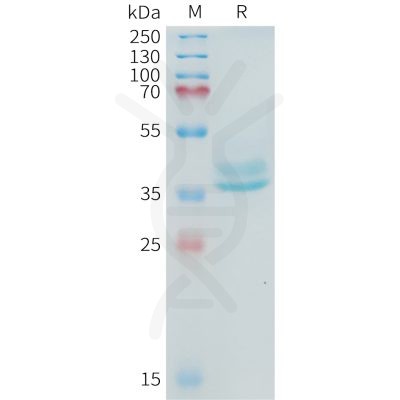| TARGET | |
|---|---|
| SYNONYMS |
CSVP; TACE; CD156B; NISBD1 |
| DESCRIPTION |
Recombinant human ADAM17(581-642) Protein with C-terminal human Fc tag |
| DELIVERY |
In Stock |
| UNIPROT ID |
P78536 |
| EXPRESSION HOST |
HEK293 |
| TAG |
C-Human Fc tag |
| MOLECULAR CHARACTERIZATION |
ADAM17(Phe581-Glu642) hFc(Glu99-Ala330) |
| MOLECULAR WEIGHT |
The protein has a predicted molecular mass of 33.1 kDa after removal of the signal peptide. The apparent molecular mass of ADAM17(581-642)-hFc is approximately 35-55 kDa due to glycosylation. |
| PURITY |
The purity of the protein is greater than 95% as determined by SDS-PAGE and Coomassie blue staining. |
| FORMULATION & RECONSTITUTION |
Lyophilized from sterile PBS, pH 7.4. Normally 5 % – 8% trehalose is added as protectants before lyophilization. Please see Certificate of Analysis for specific instructions. |
| STORAGE & SHIPPING |
Store at -20°C to -80°C for 12 months in lyophilized form. After reconstitution, if not intended for use within a month, aliquot and store at -80°C (Avoid repeated freezing and thawing). Lyophilized proteins are shipped at ambient temperature. |
| BACKGROUND |
This gene encodes a member of the ADAM (a disintegrin and metalloprotease domain) family. Members of this family are membrane-anchored proteins structurally related to snake venom disintegrins, and have been implicated in a variety of biologic processes involving cell-cell and cell-matrix interactions, including fertilization, muscle development, and neurogenesis. The encoded preproprotein is proteolytically processed to generate the mature protease. The encoded protease functions in the ectodomain shedding of tumor necrosis factor-alpha, in which soluble tumor necrosis factor-alpha is released from the membrane-bound precursor. This protease also functions in the processing of numerous other substrates, including cell adhesion proteins, cytokine and growth factor receptors and epidermal growth factor (EGF) receptor ligands, and plays a prominent role in the activation of the Notch signaling pathway. Elevated expression of this gene has been observed in specific cell types derived from psoriasis, rheumatoid arthritis, multiple sclerosis and Crohn's disease patients, suggesting that the encoded protein may play a role in autoimmune disease. Additionally, this protease may play a role in viral infection through its cleavage of ACE2, the cellular receptor for SARS-CoV and SARS-CoV-2. [provided by RefSeq, Aug 2020] |
| USAGE |
Research use only |
1
/
의
1
Dima Biotech
SKU(재고 관리 코드):PME101098
Human ADAM17 Protein, hFc Tag
Human ADAM17 Protein, hFc Tag
PRODUCT DATA
IMAGES

Figure 1. Human ADAM17(581-642) Protein, hFc Tag on SDS-PAGE under reducing condition.
Share


